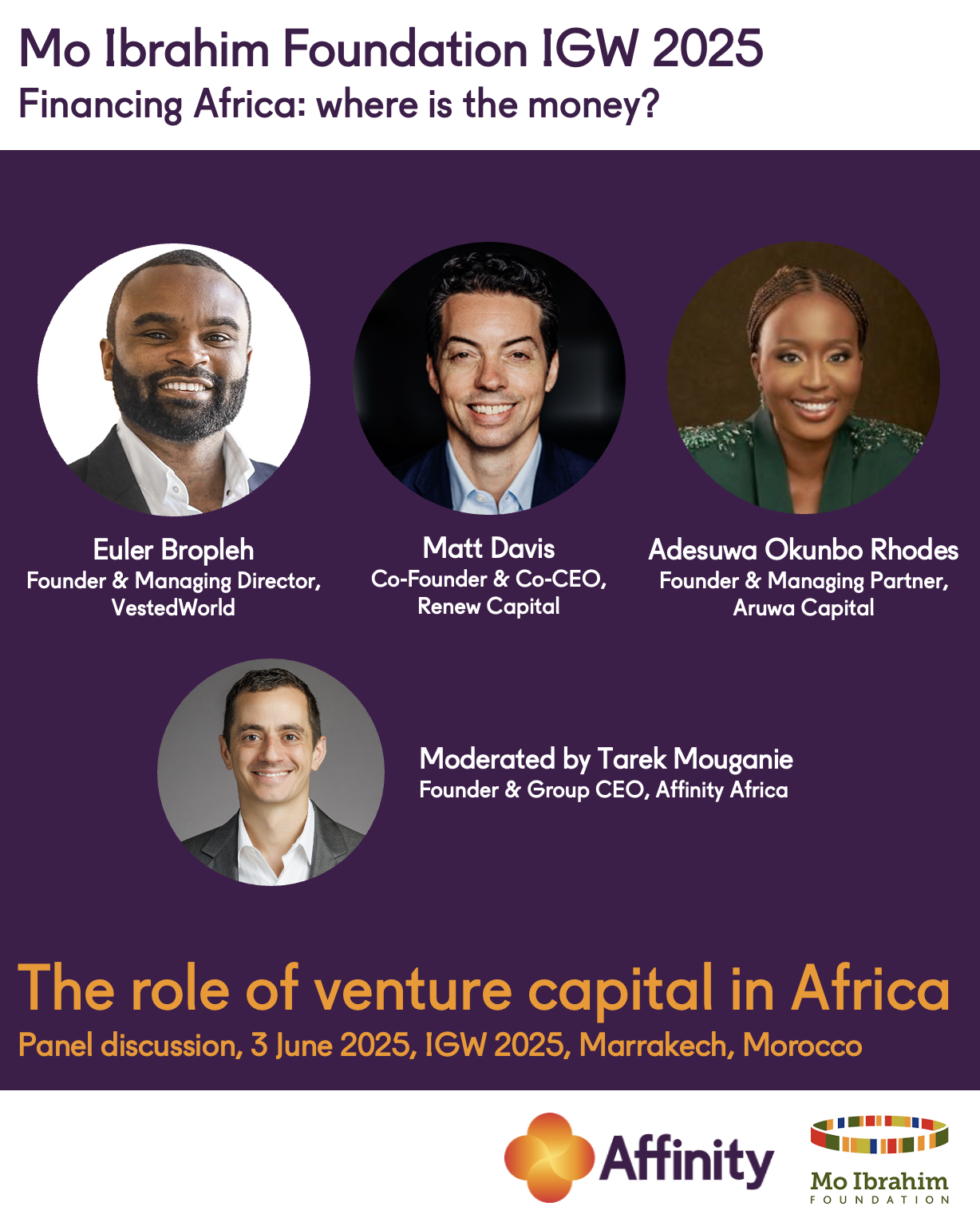
Mo Ibrahim Foundation 2025: The role of VC in Africa
It’s been a few days since we returned from the Ibrahim Governance Weekend #IGW25, hosted by the Mo Ibrahim Foundation, and we are still energized by the thoughtful (and provoking) discussions, and the inspiring people we had the chance to meet.
It was a privilege to moderate the panel on “The Role of Venture Capital in Africa”, a topic that feels more urgent than ever as international funding flows into the continent have slowed significantly in recent years. Joining us on stage were three incredible local investors: Euler Bropleh of VestedWorld , Matthew Davis of Renew Capital, and Adesuwa Okunbo Rhodes of Aruwa Capital Management.
Here are some of the key insights and reflections that have stayed with us since:
1. We need our own playbook for investing in Africa
In most parts of the world, “impact investing” is a niche. In Africa, it’s the default. Capital deployed here has the potential to transform economies and lives because the challenges startups are tackling—from access to finance and healthcare to education and infrastructure—are foundational. It’s not about improving what already exists. It’s about building what’s never been built.
Tech innovation in Africa isn’t about disruption for its own sake. It’s about constructing ecosystems, bridging structural gaps, and unlocking real economic opportunity. As was pointed out, this may be the only region in the world where you can generate returns and materially improve lives. That alignment between profit and purpose makes investing in Africa uniquely powerful and urgently needed.
But it also means venture capital here needs a different playbook. The Silicon Valley model doesn’t fit. Growth in Africa shouldn’t be anchored to a “grow-at-all-costs” mindset. It should be rooted in resilience, sustainability, and the ability to thrive within our own context.
That’s why the role of the local African VC is so critical. They know the market. They understand the daily friction of a mother struggling to get her children to school on flooded roads, the challenge of opening a bank account, or the complexity of receiving a delivery at home. They help both founders and LPs see the true shape of the opportunity and adopt the mindset needed to seize it.
2. To build successful products, we have to build the rails first
Many startups in Africa aren’t just solving customer needs, they’re solving infrastructure gaps. As Adesuwa Okunbo Rhodes put it bluntly: “There’s no Amazon without roads.” In this context, successful startups aren’t just building products, they’re doing something far bigger. They’re constructing entire ecosystems, using creativity, grit, and a deep understanding of local challenges to have a transformative impact on Africa’s present and future.
But today’s founders are at an inflection point. With funding tightening across the continent, many are caught between two opposing forces: the pressure to grow and the instinct to conserve. It’s a delicate balancing act that’s reshaping how founders and VCs work together.
Several investors on the panel noted that they’ve seen founders become overly cautious, even risk-averse, in response to market uncertainty and capital scarcity. And while prudence is wise, too much caution can stall momentum and, perhaps more importantly, leave critical problems of the continent unsolved.
In our markets, execution risk is often the greatest risk. This is where local investors play a vital role, not just as capital providers, but as partners in helping founders build discipline, focus, and long-term strategy. Especially when the path is unclear and resources are limited, that kind of partnership is one of the most valuable assets a VC can bring to the table.
3. Africa must own its future
The theme of the weekend at #IGW25 was “Financing Africa: Where is the Money?”, a very timely conversation as there has been a lot of discussion lately about whether Africa should continue doing more with less, or become self-sufficient.
With international aid declining and global venture flows contracting, the answer is increasingly clear: Africa must build the systems and resilience to stand on its own.
This shift starts with how we fund our own innovation. Africa might appear capital-scarse, but what we really lack is capital in motion. Over $220 billion sits in African pension funds, mostly locked into low-yield, fixed-income instruments, that at times don’t even beat the high inflation rates of some of our countries. Meanwhile, critical sectors like infrastructure, SMEs, and high-impact startups remain severely underfunded.
If we’re serious about building a self-sustaining investment ecosystem, we need to unlock these domestic capital pools. That means, more than anything, shifting mindsets. For example, Ghana’s new policy mandating that 5% of pension funds be allocated to venture capital and private equity is a strong start. But passing policy alone isn’t enough. We need effective enforcement, education, and trust.
We can’t rely indefinitely on foreign capital with global cycle dependencies. To truly scale innovation on the continent, Africa must be able to fund itself from within.
These, and so many other important conversations, took place at #IGW25. The Mo Ibrahim Foundation doesn’t just host an event; it creates a platform for honest, often uncomfortable but always necessary, dialogue about where Africa stands and where we’re heading.
In a landscape that too often dwells on what’s missing, this space invites us to ask better questions, challenge long-held assumptions, and imagine ourselves not as entitled to solutions, but as responsible for creating them. For those of us building on the ground, that kind of provocation isn’t just useful, it’s essential.


